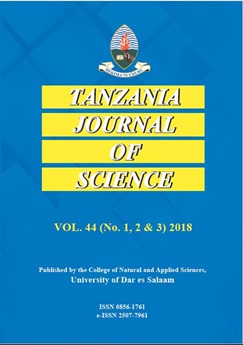Density and Aboriginal Uses of Wild Tree Species in Milawilila Forest Reserve in Morogoro Region, Tanzania
Abstract
This study assessed density and local uses of wild tree species in Milawilila forest reserve, Morogoro rural district. A total of six transects were set in the forest for assessing density and diversity of trees. In each transect, three plots of 20 m x 20 m were established and all trees with Diameter at Breast Height (DBH) ‰¥ 10 cm were identified, counted and DBH recorded in each plot. A semi structured questionnaire was used to obtain data on the use of tree species by the locals. Data were analyzed using Microsoft Excel and Statistical Package for Social Science software. A total of 172 trees/ha belonging to 20 species and 15 families were recorded in the forest. Among the families, Fabaceae was the richest family with 3 species, followed by Annonaceae and Cluciaceae with 2 species each. The most abundant species were Xylopia parviflora, Ehretia amoena and Diospyros squarrosa, which contributed 46% of the total tree density in the forest while the remaining 17 species contributed 54%. The Shannon-Wiener diversity index and basal area of the forest was 2.62 and 13.0 m2/ha, respectively. The forest exhibited good regeneration pattern. The proportion of tree species used for medicines was 76%, constructions 60%, fuelwood 56%, crafts 52%, and food/fodder 28%. The three species with high citation index were Albizia glaberrima (3.58), Annona senegalensis (3.38) and Scorodophleous fischeri (3.16). Since, majority of the observed species were less dense, the study suggests planting of the wild tree species should be prioritized to guarantee sustainability of the forest reserve and viable supply of forest products and services to the community.Keywords: Aboriginal uses, IVI, Milawilila forest, tree density, wild tree species


